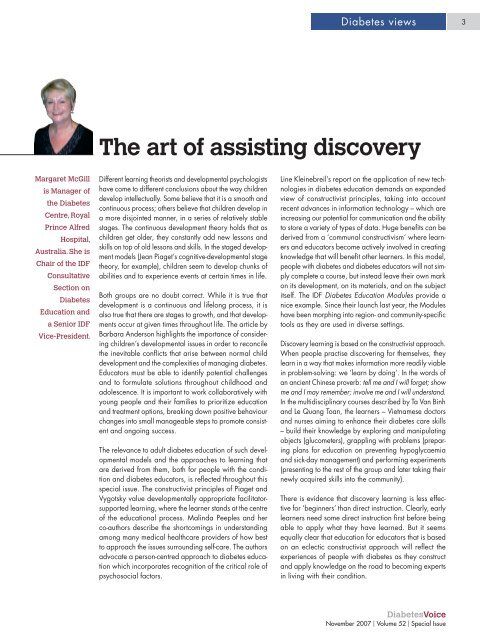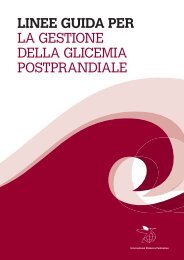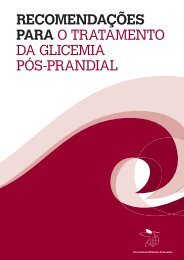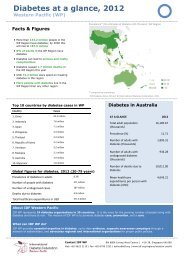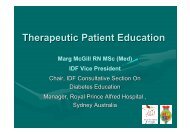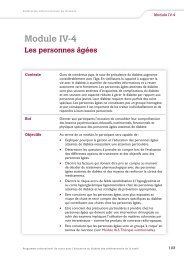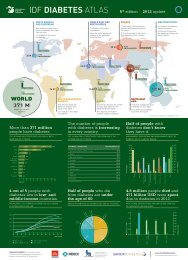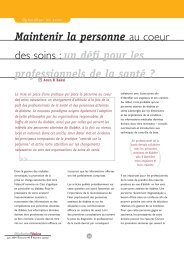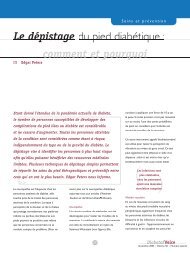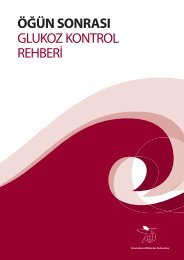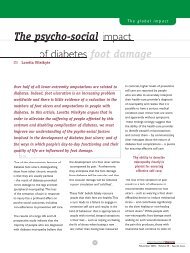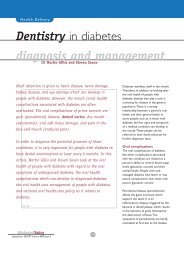Diabetes education - International Diabetes Federation
Diabetes education - International Diabetes Federation
Diabetes education - International Diabetes Federation
You also want an ePaper? Increase the reach of your titles
YUMPU automatically turns print PDFs into web optimized ePapers that Google loves.
<strong>Diabetes</strong> views<br />
<br />
The art of assisting discovery<br />
Margaret McGill<br />
is Manager of<br />
the <strong>Diabetes</strong><br />
Centre, Royal<br />
Prince Alfred<br />
Hospital,<br />
Australia. She is<br />
Chair of the IDF<br />
Consultative<br />
Section on<br />
<strong>Diabetes</strong><br />
Education and<br />
a Senior IDF<br />
Vice-President.<br />
Different learning theorists and developmental psychologists<br />
have come to different conclusions about the way children<br />
develop intellectually. Some believe that it is a smooth and<br />
continuous process; others believe that children develop in<br />
a more disjointed manner, in a series of relatively stable<br />
stages. The continuous development theory holds that as<br />
children get older, they constantly add new lessons and<br />
skills on top of old lessons and skills. In the staged development<br />
models (Jean Piaget’s cognitive-developmental stage<br />
theory, for example), children seem to develop chunks of<br />
abilities and to experience events at certain times in life.<br />
Both groups are no doubt correct. While it is true that<br />
development is a continuous and lifelong process, it is<br />
also true that there are stages to growth, and that developments<br />
occur at given times throughout life. The article by<br />
Barbara Anderson highlights the importance of considering<br />
children’s developmental issues in order to reconcile<br />
the inevitable conflicts that arise between normal child<br />
development and the complexities of managing diabetes.<br />
Educators must be able to identify potential challenges<br />
and to formulate solutions throughout childhood and<br />
adolescence. It is important to work collaboratively with<br />
young people and their families to prioritize <strong>education</strong><br />
and treatment options, breaking down positive behaviour<br />
changes into small manageable steps to promote consistent<br />
and ongoing success.<br />
The relevance to adult diabetes <strong>education</strong> of such developmental<br />
models and the approaches to learning that<br />
are derived from them, both for people with the condition<br />
and diabetes educators, is reflected throughout this<br />
special issue. The constructivist principles of Piaget and<br />
Vygotsky value developmentally appropriate facilitatorsupported<br />
learning, where the learner stands at the centre<br />
of the <strong>education</strong>al process. Malinda Peeples and her<br />
co-authors describe the shortcomings in understanding<br />
among many medical healthcare providers of how best<br />
to approach the issues surrounding self-care. The authors<br />
advocate a person-centred approach to diabetes <strong>education</strong><br />
which incorporates recognition of the critical role of<br />
psychosocial factors.<br />
Line Kleinebreil’s report on the application of new technologies<br />
in diabetes <strong>education</strong> demands an expanded<br />
view of constructivist principles, taking into account<br />
recent advances in information technology – which are<br />
increasing our potential for communication and the ability<br />
to store a variety of types of data. Huge benefits can be<br />
derived from a ‘communal constructivism’ where learners<br />
and educators become actively involved in creating<br />
knowledge that will benefit other learners. In this model,<br />
people with diabetes and diabetes educators will not simply<br />
complete a course, but instead leave their own mark<br />
on its development, on its materials, and on the subject<br />
itself. The IDF <strong>Diabetes</strong> Education Modules provide a<br />
nice example. Since their launch last year, the Modules<br />
have been morphing into region- and community-specific<br />
tools as they are used in diverse settings.<br />
Discovery learning is based on the constructivist approach.<br />
When people practise discovering for themselves, they<br />
learn in a way that makes information more readily viable<br />
in problem-solving: we ‘learn by doing’. In the words of<br />
an ancient Chinese proverb: tell me and I will forget; show<br />
me and I may remember; involve me and I will understand.<br />
In the multidisciplinary courses described by Ta Van Binh<br />
and Le Quang Toan, the learners – Vietnamese doctors<br />
and nurses aiming to enhance their diabetes care skills<br />
– build their knowledge by exploring and manipulating<br />
objects (glucometers), grappling with problems (preparing<br />
plans for <strong>education</strong> on preventing hypoglycaemia<br />
and sick-day management) and performing experiments<br />
(presenting to the rest of the group and later taking their<br />
newly acquired skills into the community).<br />
There is evidence that discovery learning is less effective<br />
for ‘beginners’ than direct instruction. Clearly, early<br />
learners need some direct instruction first before being<br />
able to apply what they have learned. But it seems<br />
equally clear that <strong>education</strong> for educators that is based<br />
on an eclectic constructivist approach will reflect the<br />
experiences of people with diabetes as they construct<br />
and apply knowledge on the road to becoming experts<br />
in living with their condition.<br />
November 2007 | Volume 52 | Special Issue


